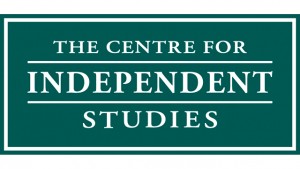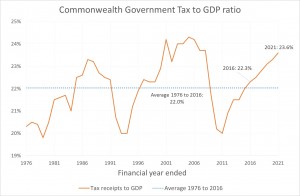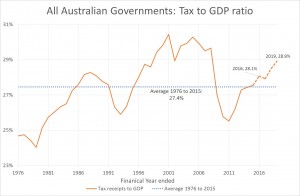Home » Commentary » Media Release » MEDIA RELEASE: Budget should reject claims taxes are too low
 The upcoming budget should not give in to claims Australia has a tax revenue problem, according to Centre for Independent Studies economist Michael Potter.
The upcoming budget should not give in to claims Australia has a tax revenue problem, according to Centre for Independent Studies economist Michael Potter.
“Tax is above its historical average; above the average for previous times when the budget was close to balance; above the average when the deficit is included; and the tax burden of all Australian governments is above average,” Mr Potter said.
“If there is a problem, it is that taxes are too high rather than too low.
“The Commonwealth tax to GDP ratio is currently at 22.3%. This is above its 40-year average of 22.0%, and is set to go well above this average. This comparison does not show we have a revenue problem,” Mr Potter said. A graph showing this is attached.
“Tax is also at or around 10-, 20- and 30-year averages. So to make a case for tax increases, some commentators compare our current tax levels to cherry-picked years when taxes were abnormally high. For example, in a recent report CEDA used the years 2000–01 to 2007–08, when tax averaged 23.9% of GDP.
“This comparison is not justified. This was a completely atypical period in Australia’s history, with a massive mining boom. We can’t, and we shouldn’t, be matching the tax levels at that time.
“Australia is nowhere near this situation today. Non-mining investment is very weak, as is wages growth, while national income is actually falling. It is absurd to think we could just replicate the tax levels from the middle of the boom,” Mr Potter said.
Based on comments from Moody’s and other ratings agencies, some are arguing for tax increases to close the budget deficit. “However, this can’t be justified, based on comparisons with periods when we were at or near budget balance,” Mr Potter said.
“During the past 40 years, when the budget was within 0.25% of balance, tax averaged 22.2% of GDP, which is less than its current level, while spending was 24.1% of GDP, a full 1.8 percentage points lower than today.
“In the past, taxes were higher when the budget was further away from balance: but Australia should move towards a balanced budget not further away. And regardless, spending was much lower than today,” Mr Potter said.
“The introduction of the GST increased the Commonwealth tax take: but the State tax take went down. The best way of dealing this transfer of tax powers is to look at the tax burden of all Australian governments put together.
“Again on this measure, the current tax burden of 28.1% is well above its long term average of 27.4% and set to go much higher [see second graph below].
“This evidence is in addition to the costs of tax increases, as clearly shown by the Treasury: tax hikes will cut employment, wages, household incomes, GDP and investment.
“The last thing that Australia needs is for the government to cave in to the demands for tax increases,” Mr Potter said.
Michael Potter is a Research Fellow in the Economics Program at the Centre for Independent Studies




MEDIA RELEASE: Budget should reject claims taxes are too low